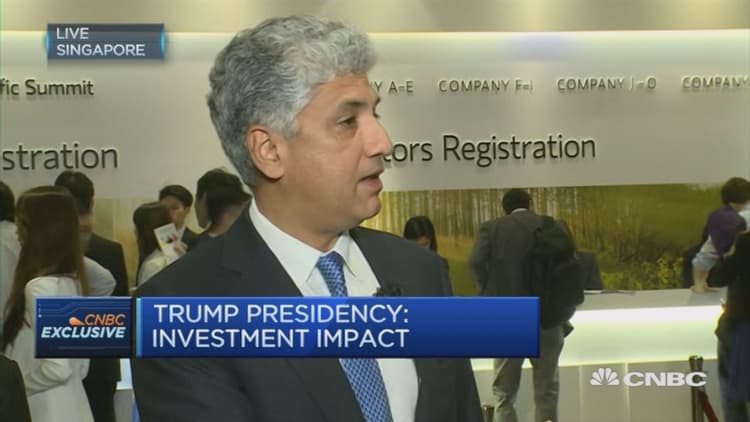
Emerging markets (EMs) are in a better shape to handle the potential market impact of a Donald Trump victory, Morgan Stanley's Asia Pacific co-CEO told CNBC.
Emerging markets were assuming certain outcomes based on what the (Trump) campaign said about trade protectionism, immigration, capital repatriation and were selling off partly on account of that, Gokul Laroia told CNBC's "Squawk Box."
A combination of high real rate differentials, low current account deficits and lower debt levels than in the past would help EMs in the longer term, according to Laroia.
The exception was China which he said had its own "idiosyncratic issues." Beyond trade, with Trump previously promising to impose a 45 percent tariff on Chinese imports, the mainland is unlikely to be affected by the overall trade dynamic of the U.S., Laroia added.
Since Trump won the presidential election last week, EM currencies have fallen against the dollar: the has dropped 9.66 percent, the has fallen 2.27 percent, while the Indonesian rupiah has slipped 2.07 percent.
Bond yields have also risen globally, with the 10-year U.S. Treasury yield climbing above 2 percent from levels below 1.8 percent days before the election, creating a negative feedback loop for EM assets.
Higher bond yields in developed markets could dim the allure of riskier emerging markets while also making it more expensive for borrowers in developing countries to refinance their debt.
Data from the Institute of International Finance showed foreigners pulled nearly $6 billion from just eight emerging-market countries since the election, evenly spread between debt and equity. The countries included in the sample were India, Indonesia, South Korea, Thailand, the Philippines, South Africa, Brazil and Hungary.
Moreover, experts have also said previously that Trump's domestic policies could spark inflationary pressure in the U.S. economy, which could prompt the Fed to raise rates more aggressively.
Laroia said uncertainty persisted over the Trump administration's economic policies.
"Some of this will become clearer as we see the cabinet appointments fill out ... at this point in time, the market's made some judgments. We'll see if they are right."
— Leslie Shaffer contributed to this report.


